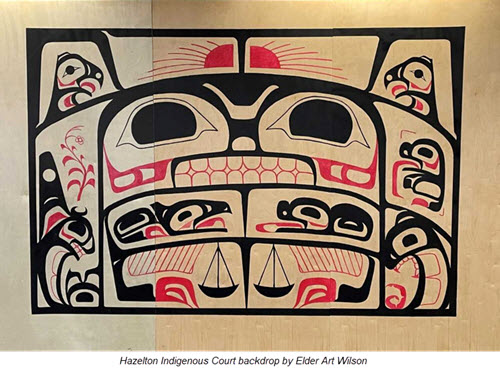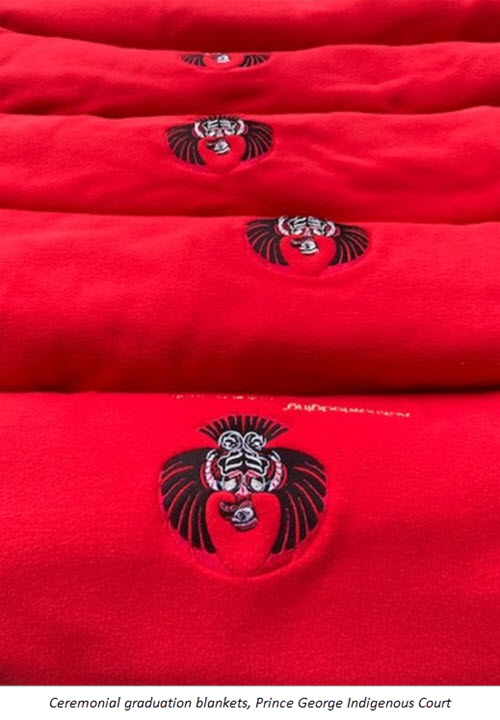The Provincial Court of BC has nine sentencing courts for Indigenous people charged with criminal offences:
- New Westminster First Nations Court (opened November 2006)
- North Vancouver Chet wa nexwníw̓ ta S7eḵw’í7tel Indigenous Court (opened February 2012, serves Whistler, Squamish and the North Shore)
- Kamloops Cknucwentn First Nations Sentencing Court (opened March 2013)
- Duncan First Nations Court (opened May 2013)
- Nicola Valley Indigenous Court (opened in Merritt, October 2017)
- Prince George Indigenous Court (opened April 2018)
- Williams Lake Indigenous Court (opened December 2020)
- Hazelton Indigenous Court (opened August 2021)
- Lillooet Indigenous Court (opened September 2023)
Contact to participate
If you identify as Indigenous, want to plead guilty, and are ready to do the healing work described on this page under "Operation", speak to your lawyer or Duty Counsel. They can talk to the Indigenous court prosecutor for you.
Specialized Work
Our Indigenous and First Nations courts do not conduct trials. They are sentencing courts for people who:
- identify as Indigenous;
- plead guilty to a criminal offence; and
- have the prosecutor’s agreement to participate.
Operation
A Judge Explains BC's Indigenous and First Nations (8 minute video)
Although each court has developed procedures, participants, resources, and services to meet its communities’ needs, BC’s Indigenous Courts generally share these elements:
- Court may begin and end with a prayer. It may include a ceremony used by Indigenous groups to cleanse the spirit and bring forth good energy, such as smudging. These ceremonies serve to acknowledge traditional Indigenous practices, engage with Indigenous culture, and ground the day ahead.
- Offenders usually sit in a circle with the judge, lawyers, and others. The circle may include victims, First Nations Elders, and support people. Local First Nations communities are encouraged to contribute to the proceedings.
- Participants discuss the offending behaviour and its impact. Offenders share their backgrounds and special circumstances. Together, they create a healing plan that may be incorporated in the judge’s sentence.
- The healing plan is at the heart of BC’s Indigenous Courts. It balances the legal requirements of the traditional court system with Indigenous ways and laws. A healing plan can include both traditional and therapeutic forms of sentencing. For example, a probation order might include attending sweat lodges, addiction treatment, and steps to reconnect with an Indigenous community.
- An offender whose sentence includes a healing plan leaves court with two key responsibilities - to work with support and service providers and to report their progress to the Court, usually every three to six months. When they do this, they receive feedback from Elders and the judge.
- An offender who successfully completes a healing plan graduates from the Indigenous Court and may have a blanket ceremony symbolizing a new beginning. The blanket represents strength against vulnerabilities and the unknown. When an Elder wraps someone in a ceremonial blanket, it symbolizes support, protection, growth, and community acceptance and forgiveness.
- In some cases, offenders complete their healing plans while on bail and prosecutors do not proceed with their charges.
Development
- Each Indigenous court was developed in collaboration with local First Nations, the communities at large, Legal Aid BC, BC government, Crown and defence lawyers, Community Corrections, police, and groups like the Native Courtworker and Counselling Association of BC.
- Each is uniquely designed to meet the needs of the communities it serves. While procedures may vary, their approaches are similar.
- Development of an Indigenous court involves extensive consultation and preparation, including training for Indigenous Elders and other court participants.

Goals
Indigenous courts’ goals include:
- to acknowledge the history and recognize the unique circumstances of Indigenous offenders within the framework of Canada’s Criminal Code and other laws
- to examine causes of an offender’s crime and use a collaborative, holistic approach for healing to help them avoid criminal behaviour in the future
- to acknowledge and repair harm done to victims, families, and communities
Community partners
- Indigenous Elders play an important role in BC’s Indigenous courts, helping an offender create a healing plan, lending support, and monitoring their progress.
- Local First Nations, their therapeutic resources, and those in the wider community offer support to victims and offenders.

More information
Reconciliation in Action - a BC Provincial Court Report on the New Westminster First Nations Court, January 2024
Traditional Justice, Globe and Mail, January 9, 2015 - the story behind a case in the First Nations Court in Duncan
Can First Nations Court stop Indigenous women from ending up in prison? Public Radio International, April 18, 2018 - a story from North Vancouver First Nations Court
Hazelton Indigenous Court marks first anniversary eNews
New First Nations Court opens in Nicola Valley eNews
Graduates and contributors honoured at North Vancouver Indigenous Court’s 7th anniversary eNews
Cknucwentn First Nations Court, Kamloops eNews
UVIC law students’ perspectives on Duncan First Nations Court eNews
First Nations Court in New Westminster eNews
TRU’s Indigenous Law Students Association visits Cknúcwentn First Nations Court eNews
First Nations Court (53 minute video includes scenes depicting a sentencing)

